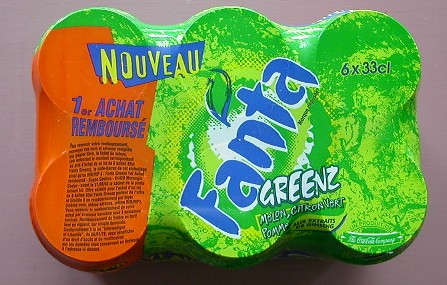Mon pin’s est greenz
English translation in preparation. This post explores a specifically French phenomenon: the extraneous z, which, pseudo-English like, keeps cropping up at the end of words in the most unlikely fashion.
Ça y est, j’ai décidé de me mettre à la collection des z superfétatoires, ces lettres à valeur plus ornementale que grammaticale, qui s’accrochent, sorties d’on ne sait pas bien où, à la fin de mots et ponctuent les panneaux publicitaires et autres écrits de l’espace publique.

Si vous me connaissez vous savez que je n’ai rien d’une gardienne de la langue. J’aime bien les anglicismes et autres emprunts pourvu qu’ils soient intelligents et employés à bon escient. Je ne prétends même point que mon escient soit toujours bon… et il m’arrive de commettre des germanismes en français, des gallicismes en anglais, et les deux en allemand.
Ceci dit, c’est bien un petit mouvement de recul effrayé qui m’a donné envie d’y regarder de plus près Il y a deux jours, assoiffée et enveloppée dans la chaleur de la ville estivale, j’entreprends d’acquérir une bouteille d’eau minérale. Alors, mon regard s’arrête sur une canette tout en vert fluo, sur laquelle il est écrit le nom de la boisson : Fanta Greenz.
Bien que n’aimant pas les sodas, je le considérais comme mon devoir d’amatrice de langues de laisser tomber l’eau et de m’abreuver de cet étrange mélange de jus de melon, citron vert et pomme, de sucre et d’arômes chimiques. Qui dit que ma passion ne me fasse courir de risques corporelles… (J’admets que j’avais bien moins soif après l’avoir bu.) L’Intenet (de telles infos sont le point fort de Wikipédia) m’apprend d’ailleurs qu’en France, le Fanta (pourquoi « le » ?) existe aussi au parfum « Latina » et « Madness ».

Au commencement de cette folie, je suppose, était le boyz band. Peu importe qu’une telle troupe musico-dansante s’appelle boy band dans la langue de Robbie Williams (et boy bands au pluriel), en France, c’est très souvent comme ça qu’on l’écrit.
Pour dater son entrée sur les territoires de la langue française, nous pouvons nous tourner vers les forums Usenet, antérieurs à Internet et archivés par Google Groups. Dans les fils discussion en anglais, l’orthographe « boyz » se trouve à partir de 1986 dans certains noms (« Pink Boyz ») de groupes de musique « gaffa » (je n’ai aucune idée à quoi cela ressemble), et dans l’imitation du langage enfantin ; elle a certainement été employée, occasionnellement, avant cette date.
Dans l’espace francophone, l’emploi de « boyz band » comme nom propre apparaît pour la première fois sous le clavier d’un/e certain/e deluca, le 19 Juin 1997 à 19 heures 54 minutes et 34 secondes heure de Paris sur le forum fr.rec.musiques :
Un truc que j’aimerais bien de savoir, c’est combien des chaines comme MCM recoivent pour faire leur emission uniquement consacree aux boyz band.
(Rappelons-nous qu’à cette époque les lettres accentuées faisaient parfois un joli bordel quand on essayait de les taper dans un forum Usenet sans procéder à des réglages pas toujours évidents.)
Cet exemple précoce du z superfétatoire en montre déjà les caractéristiques principales :
L’aspect phonologique. Le phénomène prouve quand même une chose louable : Les locuteurs français ont compris que le s du pluriel anglais est une consonne sonore quand le dernier son du nom est soit une voyelle (comme dans « boys »), soit une autre consonne sonore (comme dans « greens », pluriel qui, notons-le, désigne les légumes vertes).
Le z superfétatoire a la curieuse tendance de transformer toute expression qu’il touche en nom invariable : Admettons qu’on dise « un boyz band » en français. Le pluriel devrait être « des boyz bands », pas vrai ? Une recherche sur les pages francophones de Google nous montre que l’usage hésite. Les boyz band invariables sont légion.
Ce que les moteurs de recherche nous apprennent en outre, c’est que « boyz band », tout comme les autres noms au z superfétatoire, peut prendre un apostrophe facultatif et, je suppose, ornemental lui aussi. Il peut se mettre au choix avant ou après, ce qui donne « boy’z band » et « boyz’ band », attestés tous les deux.
Comme tout nom commun qui se respecte, « boyz band » peut remplir toutes les fonctions grammaticales que les noms peuvent endosser. Il peut même devenir une synecdoque et faire référence à un membre unique d’un tel groupe. Ainsi, un certain Gégé nous apprend:
Ma carrière de boyz band avait été aussi courte qu’humiliante et je commençais à mal tourner.
Ce qui vient d’être dit vaut également pour les beaucoup plus rares « girlz band » en évidence.
Avant de terminer la première partie de cet exposé sur le z superfétatoire, mentionnons qu’il y a un précurseur du boyz band: le pin’s, avec son apostrophe-s ô combien logique. La deuxième jettera un regard plus pénétrant sur ce phénomène et s’attaquera aux « djeunz », ce non-anglicisme parfaitement Made in France.
Related posts: Moins dérangeants politiquement pingouins, Minimalist Kitkat, Google Belge : problème d'orthographe, Finex ! Pooo !, About that other Superdome, Nutella, left-wing and macho, Cinderella, vair or verre?
Technorati (tags): advertising, anglicismes, anglicisms, French, language, langue française, orthographe, publicité, spelling













